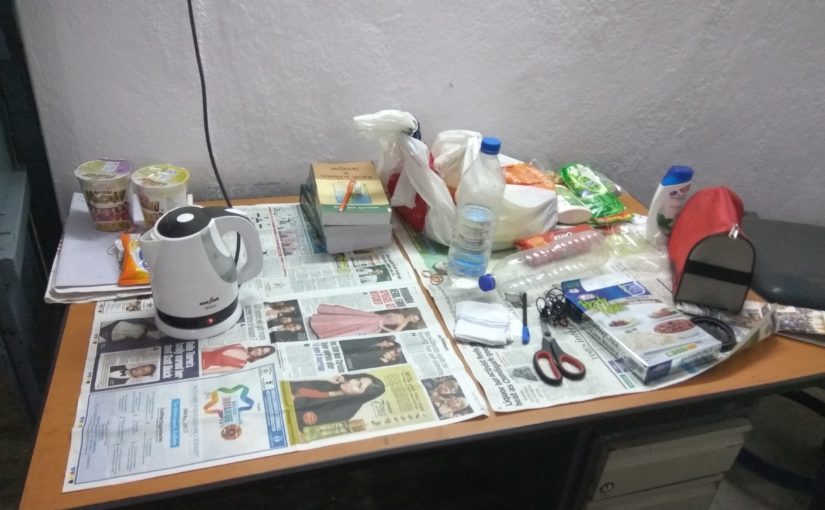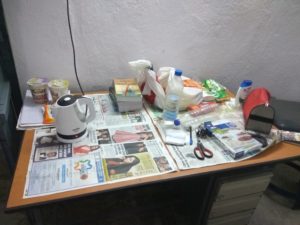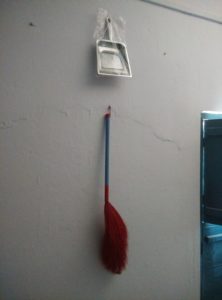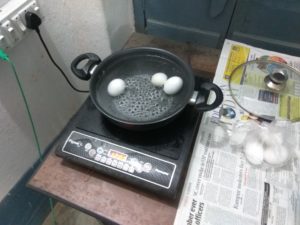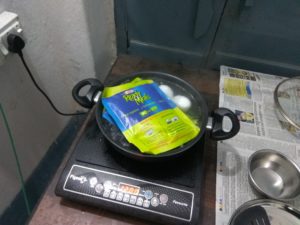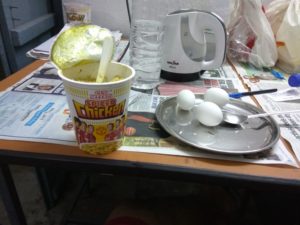Now that I’ve harangued about my personal life and its comforts and discomforts, let me talk about the professional part of my existence. This was the part for which I was paid by the government (literally) and was also the part which allowed me to live my life with dignity. The dignity of a teacher in a remote town of West Bengal.
As the regular reader of my blog (a fictional character I’m sure) would surely know, this wasn’t my first job as a teacher, but it was my first job as an Assistant Professor. In other words, this was my first permanent job with the full pay. Other than that, my duties were pretty much expected to be the same. After all, I’d already been a fruitful member of staff of Bhawanipur Educational Society College (BESC) for over half a year. How hard could Tehatta be ?
Pretty hard. At least that was my impression initially. Unlike the rather well-equipped college that I’d left, Tehatta literally had empty halls and emptier staff rolls. The college, from what I gleaned initially, had about half a dozen academic staff and about half that number of non-academic staff. This included the guards who doubled up as Group-C staff, Group-D staff who also doubled up as Group C staff, and a couple of group B staffers approaching superannuation.
The department itself had only one teacher apart from me, and thankfully, he took his job seriously. As such, the department was rather well run when I arrived, and with just one academic batch to teach, the course was also chugging along. As it turned out though, my department was somewhat lucky in having a teacher who had some experience. Others were completely staffed by new folks, many of whom joined within days or weeks of my joining. By late January our teaching strength had grown to about 10, two in each department, plus the Officer-in-Charge.
It is not my intention to detail all the classes I took or all the academic or non academic responsibilities I undertook. That would be the domain of a service book or a CAS report, neither of which should find a place on a personal blog like this one. What I’ll instead talk about is the very experience of working in a place unlike any I’d worked in before.
How was it unique ? I’ve already noted the staff crunch. Another problem was the location of the college. We proudly declared that the college was nestled “in the lap of nature, beside the beautiful river Jalangi” and forgot to mention that it was on the outskirts of even Tehatta in a place called Khaspur. Even the regulars of Tehatta didn’t wish to go there, and we were regularly charged extra by the e-rickshaws (or totos or tuktukis). We also didn’t mention that the college had practically nothing except grain and jute fields all around and barring a single tea shack ( which grew to two tea shacks by the time I left) there was little by way of refreshment. The college building itself was also modest – a two storey building that boasted of fresh paint and empty halls. Another building – the canteen and Students’ Room complex – would not become functional until the very last days of my stay in Tehatta.
Now to be fair, it had been worse. Among the first to join the college was the Officer in Charge or OIC, and he fondly recalled the days when he had to sit on the stairs of the latter building because the former was still under construction. I’d heard from my Head of Department how totos flatly refused to go to the college in the initial days, forcing teachers to undertake long negotiations. Food was in eternal short supply and initially, many had to skirt the river bank in order to go to the haat bazaar proper and get a meal.
But the most difficult – and urgent – task was handling the department. Despite the yeoman duty my HOD had undertaken prior to my arrival, there simply wasn’t enough in the department to run one. For one, there were no books available, and none would become available until some months later. Once they did, they could not be given out because the accession numbers had to be added first and no one amongst us knew how to add them. Needless to say, we didn’t have a librarian at hand to do the work.
But this problem was somewhat mitigated by the enthusiasm of the students. In Bhawanipur, I’d met students who had been all too seeped in the capitalist culture and considered education another marketable commodity in which their parents were investing. It would be far fetched to argue that the students of Tehatta were the polar opposite, treating education as some sort of sacred duty. No, they also sought jobs, and education for them was also a means of getting them. Why else would subjects with less employability – like political science – get less applications while history was flooded with them ?
But there was one crucial difference. Students who came to study at the college came from backgrounds more diverse than can be listed here. However, many of them undertook substantial trouble just to turn up and study. They had to schedule their work (and almost all of them worked) to ensure that they had enough time to attend college (and tuitions, argh!) In some cases, they also had to cycle substantial distances before they could turn up to attend college. Last but not least, college for them wasn’t about freedom and enjoyment, but getting a degree which would get them somewhere in life. They took college more seriously than did the spoilt brats of BESC.
Teaching them therefore was somewhat easier. There were more inquisitive glances and less indiscipline than in BESC, and this made life easier. I was teaching in Bengali for the first time in my life, and mistakes were inevitable. A time came when the students were correcting my language and I was appreciating it and improving myself. Note however that such correction was always in a respectful manner.
Again, the students had little to do in college other than to attend classes. Hence, only those who genuinely wished to attend classes came to college. This meant that the more unruly elements dropped out gradually and simply stopped coming. Despite our attempts to ensure attendance, there was little we could do to stop them, and this ensured that the class gradually came to be composed of more and more diligent students.
In all, I got to teach only two batches, one for one and a half years and the other for a year. Yet within that time, I tried and understood what their needs were, often through inputs by the students themselves. Demands for everything, from additional classes to even tests, were frequent. Whereas in city colleges the students shied away from the idea of a test, here I was actually asked to take tests and announce results early. This I did, and the response was something anyone, even a university teacher, would probably appreciate.
But it was not just the students who shaped my life at Tehatta Government College, though they proved to be the majoritarian influence. The other part of my life involved my colleagues. In BESC I’d found good people, but people who had become used to getting things done through staff and various committees. This allowed them to delegate work and somewhat inhibited their ability to learn the nitty gritty of running a college.
Tehatta however, had no staff to speak of and the committees were basically me and my colleagues. Inevitably, we had to cooperate and learn from whatever sources we could use. In doing so, we found out more about the way a college works than perhaps many learn in their entire careers. For instance, we learned how to fill out stock books and go through the complexities of admission. We learned how to create contingency lists and put up tender notices.
Most importantly however, we learned how to cooperate with each other. This is something some people never learn, doing what little they are asked to do and expecting the rest to adjust. If this was the attitude of even one person in Tehatta, the college would have been in the doldrums. However, we somehow, found it in us to work with each other and give 110% each time, reaching out over our own metaphorical cubicles without bumping anybody. Meetings were cordial, short and fruitful. Every moment spent in the committees ensured that we learned more and got to know each other better, thus becoming better colleagues and more efficient educational administrators.
But life went beyond committees too. There were the informal spaces within the formal space of the staff room, and here too, Tehatta shone. Most of us were young, and those who were not weren’t particularly averse to joining us youthful folks. From our relationships to the stupidities of our student days, we managed to discuss everything without ever feeling self-conscious or embarrassed. We could talk about each other’s shortcomings in front of each other, and no one would be offended. We could even have little wrestling matches when we felt like it, with (thankfully) no damage to college property.
Outside the staff room, we managed to mingle and play (literally) in the field. More than one winter afternoon was spent playing badminton or fooling around with a football. It helped that we had amongst us star players who could teach us a thing or two while thoroughly enjoying themselves.
The greatest banter was of course reserved for the convivial parties we had at night. You see, it was (and is) mandatory for government employees to attend college on a bandh day. So whenever a bandh was declared, we had to arrive the day earlier, or stay on an extra day (if the bandh day was our P-day). This inevitably meant that the night before the bandh day was one when many of us stayed in Tehatta, including those who normally did not. Since the vast majority of the teachers were male and young, it made sense to gather at one’s place and have a common meal.
While we could easily have arranged for someone to cook our food or even brought food from outside, here again we chose to cook ourselves. Apart from the small financial gain we had in cooking our own food, we also got the benefit of having food cooked by our colleague-chefs. We had so many of them (I wasn’t one of them unfortunately, though I aspired to be one), that each gathering had a different primary cook and a different primary dish. True that this dish was some variant of chicken curry, but it tasted different each time, and that was part of the fun.
Of course, when we speak of our colleagues and friends, there are things that cannot be put into writing, lest they become controversial. Tehatta was no different, though I can say that most controversies were resolved with remarkable amity, allowing us to continue working with each other the way we had before.
So, in hindsight, I can say that Tehatta taught me more than I could have hoped for. It wasn’t the cakewalk that some had predicted based on the small number of students, but it was also not the hell that many cityfolk had thought a mofussil college would be. One reason for this was of course, the fact that the students proved to be more sincere and hardworking than any I’ve seen in the city. Another reason was the excellent set of teachers who managed to sink differences and work together in a way that helped all without burdening anyone. In doing so, the students and teachers taught me more than what I would have learned had I directly jumped from BESC to another city college, or even an established college in a remote region.
These lessons shall remain, even as the students and staff move on, and Tehatta itself moves farther and farther away from what I knew it to be. It would not be hyperbole to say that of the three places where I’ve taught till date, Tehatta Government College taught me more than any other, and for this, and for the great times I had with students and my colleagues, I shall always be thankful.
Au revoir!
(I’d have loved to add photos of the staff and students. However, while I realize that they share the same sentiments towards me as I do towards them, it is never wise to put up pictures of people without their permission. Also, the photos on this blog are downloadable and I wouldn’t want their photos to be misused just because of my sentimentality. Hence, where photos were the most called for, there will just be blocks and blocks of text.)
